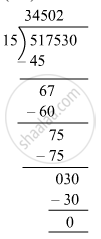Advertisements
Advertisements
Question
The population of a town is 517530. If one out of every 15 is reported to be literate, find how many literate persons are there in the town.
Solution
The population of the town = 517530
`(1/15)` of the population is reported to be literate, i.e.,
`(1/15)` × 517530 = 517530 ÷ 15

∴ There are 34502 illiterate persons in the given town.
APPEARS IN
RELATED QUESTIONS
State if the following statement is true?
12 ÷ (6 x 2) = (12 ÷ 6) x (12 ÷ 2)
Fill in the blanks to make the following a true statement:
458 + 639 = 639 + ......
Add the following numbers and check by reversing the order of the addends:
19753 + 2867
Complete the following magic square by supplying the missing numbers:
| 2 | 15 | 16 | |
| 9 | 12 | ||
| 7 | 10 | ||
| 14 | 17 |
Replace each * by the correct digit in the following:
\[\begin{array}{r}
&\texttt{5 0 0 1 0 0 3}\\
-&\texttt{* * 6 9 8 7}\\
\hline
&\texttt{4 8 4 * * * *}\\
\hline
\end{array}\]
Find the product of the largest 3-digit number and the largest 5-digit number.
Divide, and find out the quotient and remainder. Check your answer.
16135 ÷ 875
The predecessor of 10000 is
Fill in the blanks.
\[\begin{array}{r}
&\texttt{1 0 0 0 0 0 0}\\
-&\texttt{* * * * 1}\\
\hline
&\texttt{* 7 0 4 2 *}\\
\hline
\end{array}\]
On dividing a number by 53 we get 8 as quotient and 5 as remainder. The number is
The predecessor of the smallest 3-digit number is
Fill in the blanks.
The smallest natural number is ...... .
Sum of two whole numbers is always less than their product
The product of two whole numbers need not be a whole number.
A whole number divided by another whole number greater than 1 never gives the quotient equal to the former.
Sum of two whole numbers is always less than their product.
If the sum of two distinct whole numbers is odd, then their difference also must be odd.
The greatest integer lying between –10 and –15 is ______.
The successor of the integer 1 is 0.
